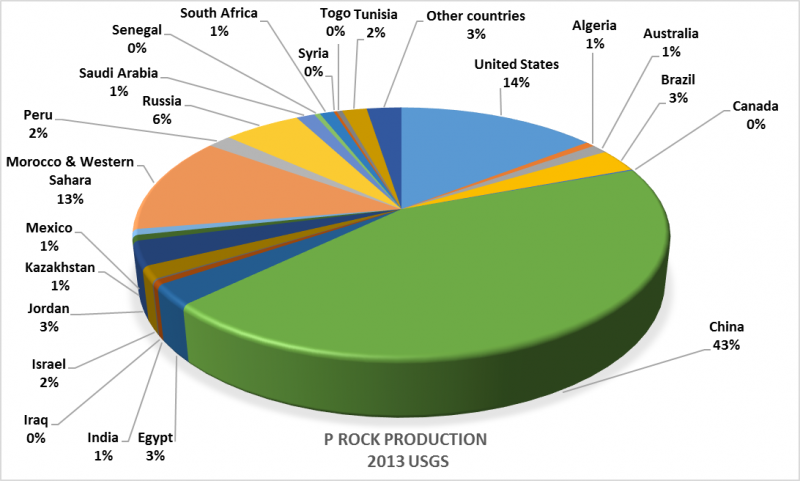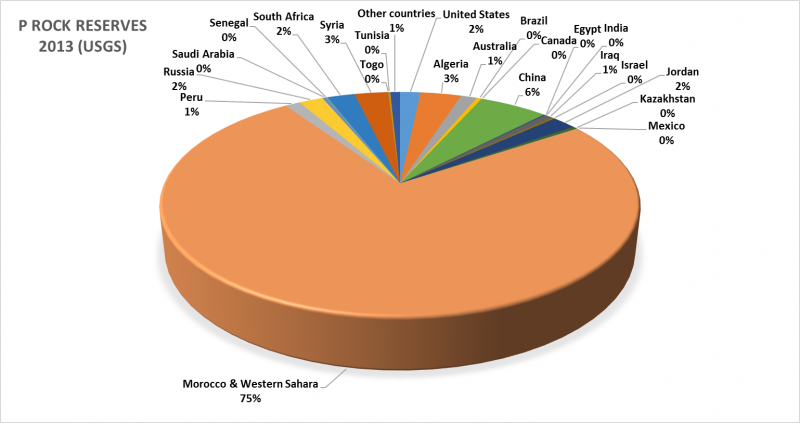- Resource recovery
- Fertiliser, soil conditioner, production of crops
- Phosphorus, the finite resource
- EU Consultative Communication on the Sustainable Use of Phosphorus
EU Consultative Communication on the Sustainable Use of Phosphorus
6080 views
Re: EU Consultative Communication on the Sustainable Use of Phosphorus
Phosphate Rock added to the EU list of critical raw materials
Here's an update on the phosphorus question. The EU did actually draft a green paper last year on sustainable use of phosphorus but this was replaced with the referred to "Consultative Communication" and this resulted in a summary working document highlighting concerns (attached). A few EU countries have developed programs to further delve into the problem (eg Netherlands, Germany, Sweden, Norway, etc.). The EU Sustainable Phosphorus Platform is an excellent source of knowledge on the topic. (www.espp.eu)
The most significant result thus far within the EU is that phosphate rock has been added to list of ca 20 critical raw materials (attached). This work is being led by DG Enterprise.
The issue is security of supply. Europe has one functioning mine in Finland that will deplete its commercial reserves within ca 30 years. The EU depends on imports and more of these will be coming from just one source, Morocco which holds ca 75% of the known global commercial reserves according to the USGS.
Morocco is building at present its production capacity to provide phosphorus to the world as other sources diminish in the US, China and elsewhere. As can be seen, China is the world's largest producer (mainly domestic consumption) and its reserves will hold for about 30-40 years. A similar trend can be seen in the US.
Here's an update on the phosphorus question. The EU did actually draft a green paper last year on sustainable use of phosphorus but this was replaced with the referred to "Consultative Communication" and this resulted in a summary working document highlighting concerns (attached). A few EU countries have developed programs to further delve into the problem (eg Netherlands, Germany, Sweden, Norway, etc.). The EU Sustainable Phosphorus Platform is an excellent source of knowledge on the topic. (www.espp.eu)
The most significant result thus far within the EU is that phosphate rock has been added to list of ca 20 critical raw materials (attached). This work is being led by DG Enterprise.
The issue is security of supply. Europe has one functioning mine in Finland that will deplete its commercial reserves within ca 30 years. The EU depends on imports and more of these will be coming from just one source, Morocco which holds ca 75% of the known global commercial reserves according to the USGS.
Morocco is building at present its production capacity to provide phosphorus to the world as other sources diminish in the US, China and elsewhere. As can be seen, China is the world's largest producer (mainly domestic consumption) and its reserves will hold for about 30-40 years. A similar trend can be seen in the US.
Arno Rosemarin PhD
Stockholm Environment Institute
This email address is being protected from spambots. You need JavaScript enabled to view it.
www.sei.org
www.ecosanres.org
Stockholm Environment Institute
This email address is being protected from spambots. You need JavaScript enabled to view it.
www.sei.org
www.ecosanres.org
Attachments:
-
 Prockprodu...2013.png
(Filesize: 311KB)
Prockprodu...2013.png
(Filesize: 311KB)
-
 Prockreserves.png
(Filesize: 252KB)
Prockreserves.png
(Filesize: 252KB)
The following user(s) like this post: jkeichholz, Elisabeth
Please Log in to join the conversation.
You need to login to replyRe: EU Consultative Communication on the Sustainable Use of Phosphorus
jonpar wrote: Related to this, I have heard a few people comment on the fact that the value of resource recovery is all related to energy. I find this somewhat surprising and wonder what the economic evidence base is for this... or is it just due to political motivations.
In today's economy it is pretty much "energy = money" and in the case of nitrogen that can be "fixed" from the atmosphere using electricity (or hydrogen, e.g. Haber-Bosch) it is quite literally true.
But even for "rare" elements like Phosphorous (or Lithium etc.) one can argue that with sufficient energy and money there is a near endless supply that could be filtered out of the oceans, but in practical terms that is hardly feasible.
On the other hand there is also the argument that currently a lot of energy is used to remove nutrients from waste-water, so that the value of recycling nutrients is often rather in the amount of energy saved for the alternative "removal" of them.
But I think especially in the case of phosphorous we will soon come to the tipping point where recycling will become the cheapest option as mineral deposits are becoming depleted or are located in politically unstable regions.
Please Log in to join the conversation.
You need to login to reply- jonpar
-
Topic Author
- As part of the Engineering team, my role at IMC is to lead on the delivery of projects requiring specific expertise on urban sanitation (including excreta/waste/wastewater/stormwater management) focusing on technical, institutional and financial aspects in project design and implementation.
Less- Posts: 223
- Karma: 24
- Likes received: 87
EU Consultative Communication on the Sustainable Use of Phosphorus
I am not involved in any way but I thought this might be of interest to some SuSanA members who have specific interest in Phosphorus recycling.
Related to this, I have heard a few people comment on the fact that the value of resource recovery is all related to energy. I find this somewhat surprising and wonder what the economic evidence base is for this... or is it just due to political motivations.
Jonathan Parkinson - IWA
****************************************************************************
EU Consultative Communication on the Sustainable Use of Phosphorus
****************************************************************************
Objective of the consultation
The Commission is launching a consultation on how to use phosphorus in a more sustainable way. Phosphorus is widely used in agriculture and is an essential component in fertiliser and feed, but it is a non-renewable resource. Supplies are limited and much phosphorus is currently wasted, creating concerns about future supplies in the EU and worldwide.
The consultation asks how to ensure that reserves are available for future generations, and about ways to minimise the undesirable side effects phosphorus use can have on the environment.
The consultation aims to launch a debate on phosphorus use and ways to make it more resource-efficient. The Communication invites the European Institutions and all interested stakeholders to comment on the issue.
ec.europa.eu/environment/consultations/phosphorus_en.htm
Period of consultation 08.07.2013 to 01.12.2013
Related to this, I have heard a few people comment on the fact that the value of resource recovery is all related to energy. I find this somewhat surprising and wonder what the economic evidence base is for this... or is it just due to political motivations.
Jonathan Parkinson - IWA
****************************************************************************
EU Consultative Communication on the Sustainable Use of Phosphorus
****************************************************************************
Objective of the consultation
The Commission is launching a consultation on how to use phosphorus in a more sustainable way. Phosphorus is widely used in agriculture and is an essential component in fertiliser and feed, but it is a non-renewable resource. Supplies are limited and much phosphorus is currently wasted, creating concerns about future supplies in the EU and worldwide.
The consultation asks how to ensure that reserves are available for future generations, and about ways to minimise the undesirable side effects phosphorus use can have on the environment.
The consultation aims to launch a debate on phosphorus use and ways to make it more resource-efficient. The Communication invites the European Institutions and all interested stakeholders to comment on the issue.
ec.europa.eu/environment/consultations/phosphorus_en.htm
Period of consultation 08.07.2013 to 01.12.2013
Dr. Jonathan Parkinson
Principal Consultant – Water and Sanitation
IMC Worldwide Ltd, Redhill, United Kingdom
Email: This email address is being protected from spambots. You need JavaScript enabled to view it.
Skype : jonathanparkinson1
Principal Consultant – Water and Sanitation
IMC Worldwide Ltd, Redhill, United Kingdom
Email: This email address is being protected from spambots. You need JavaScript enabled to view it.
Skype : jonathanparkinson1
Please Log in to join the conversation.
You need to login to reply
Share this thread:
- Resource recovery
- Fertiliser, soil conditioner, production of crops
- Phosphorus, the finite resource
- EU Consultative Communication on the Sustainable Use of Phosphorus
Recently active users. Who else has been active?
Time to create page: 0.242 seconds








